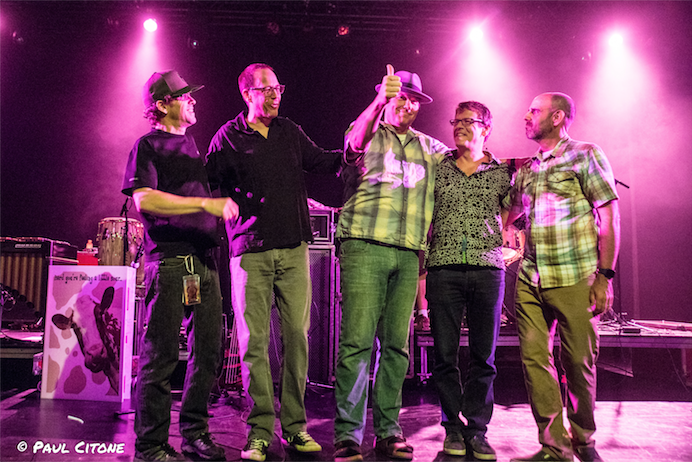
During an interview for the podcast Inside Out with Turner and Seth, moe. percussionist Jim Loughlin spoke at length about bandmate Rob Derhak’s cancer diagnosis, as well as the band’s upcoming performance at Lockn’ with Phil Lesh.
Regarding Derhak’s health, Loughlin was sure to mention that “the prognosis is excellent” and “it’s very treatable.” Derhak is apparently in good spirits and while he’s got “a tough road ahead of him” he’s ready to fight and get back onstage as soon as possible.
Loughlin said that Derhak first noticed something was wrong when he found a small lump on his neck and they discovered the full extent of his illness during a band meeting:
We do a band meeting every week over a teleconference thing, and his doctor called in the middle of our meeting. He left for a couple minutes and came back and was like, “Look, I gotta tell you something.” And then he told us they found two positive tests out of everything that they were doing. And there was just silence at first. When we all got off the phone after talking about it, obviously he had to go, no one knew what to do. He just said, “I have cancer.” It might have been a week later, actually it was like two days later, where he finally got all the information and we found out exactly what’s going on.
The percussionist also discussed the band’s revised plan for Lockn’ Festival this weekend. Originally, Derhak was going to play bass alongside Phil Lesh for their Phil.moe set on Sunday, but since he has already started treatment, Lesh will take over bass duties entirely. The setlist has yet to be determined.
“We sent [Lesh] a setlist so we’ll see,” Laughlin said. “Al [Schnier] and Vin [Amico], they know the catalogue, obviously. They’re the two biggest deadheads in the band so they worked together on a setlist and sent it out to Phil’s camp and he hasn’t said no so…”
After Lockn’, and for the foreseeable future, moe. will be on hiatus, but Loughlin is optimistic about the band’s return as well as Derhak’s resolve.
“We don’t think it’s going to be a year. The treatment in total is approximately seven weeks. Then it’s a matter of his voice coming back. We don’t have a definitive return yet. We’re shooting for New Years–hopefully before. If anything is going to make him feel better, it’s going to be playing. It’s what we do. It’s tough for a shark to stop swimming.”


No Comments comments associated with this post